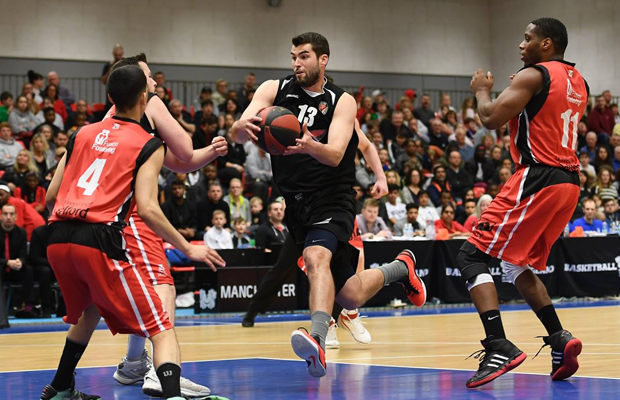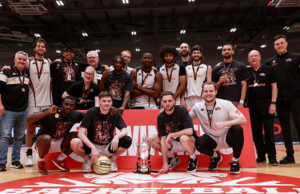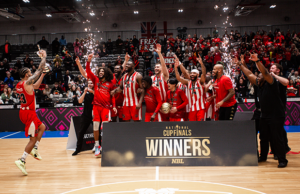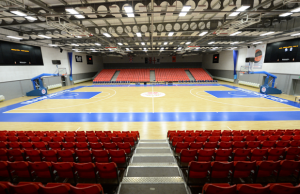Danny Carter – Reading Rockets Forward – Q&A

Guest Contribution from Samuel Bennett
Currently in his fourth season with the Reading Rockets after returning from playing NCAA basketball with Stony Brook in New York, team captain Danny Carter talks to us about a wide range of topics including his experience in the United States, development and his season with the Rockets…
Hoopsfix (H): Hi Danny, let’s start things off by asking how you got into basketball to begin with, and what your experiences were like when you were younger?
Danny Carter (DC): When I was about 12, I’d volunteer for the Thames Valley youth games at the time, and I don’t think I was going to get picked until my dad walked through the door, because he’s 6”7. I was that bad at the time I don’t think they wanted any part of me! I was playing more football at the time, and I was getting obsessed with it, so my mum kind of forced me to take up another sport.
H: And after a youth career with Reading Rockets, you moved abroad to try your hand at college basketball in the USA with Stony Brook. How did that experience benefit you, both as a player and as a person?
DC: The discipline you get taught, in terms of holding yourself accountable. Most people know that you have to get the grades academically in order to play for the college, and that’s not coming from a coach’s friendly warning, that’s coming from the NCAA. That helps you get your ass in gear really, as you go in thinking you’re only there to play basketball.
The whole setup is just done so right over there too, you can work out at two in the morning if that’s what you want and you just swipe a card and there’s food on your plate. All that stuff just allows you to improve your game.
I was unfortunate really, because as a Freshman I was doing really well, but I pushed too much trying to keep up that level, and I ended up herniating a disc in my back. So that was bye-bye basketball for a good year or so, and when I came back as a Sophomore I was getting patchy minutes. Stony Brook stuck by me, gave me a role as more of a defender, and treated me right. That’s why I was happy that I could get Akwasi (Yeboah) to go over to Stony Brook, ‘cos I knew it’d be a good situation for him.
H: And when your time at SBU finished, were you glad you ended up back where you started with the Rockets?
DC: Yeah, I wasn’t even sure if I was going to play when I finished college, but I spoke to some people at Reading like Matt Johnson and Lloyd Gardner. My plan was to come back for a year, so I was closer to my nephew and my dad, my mum, my sister and all that, and then go and do the overseas thing. But I just loved being back, I love showing the youngsters at the club that you can go down this path and do this. I like the way the club is going, and I can start my career on the side. For me, it’s a perfect situation.
H: And nowadays you’re club captain, how do you find the responsibility that comes with that and how do you rate yourself as a leader?
DC: Um, you’d have to ask my teammates! To be honest, I used to be very black and white when it came to communicating with my teammates, and I think it used to come off as a lot of me yelling at everyone. Whereas now, I think my communication is a bit better. I think something is only a mistake if you do the same thing wrong twice in a row, and I’m a bit more open to giving my experience now. I’m 28, and the next oldest guy on the team is 25, so I’m just giving all my experiences to try and help the younger people along.
I think players bounce around different teams quite a lot in this league unfortunately, so it’s important I get my experience across having spent 4 years with this team under Coach Manuel (Pena Garces) and just going out on the weekends and playing hard, doing the right things and setting the right example. I find when you’re yelling and screaming and things like that, it can be that ‘look at me’ mentality, whereas now I try to be more mellow.
Obviously, if someone hits a big shot then that intensity comes out from time to time, but if I’m going crazy and losing my rag then my team will start doing that too, and we’re such a young team that I need to make sure that I’m calm at all times.
H: Well you must be doing something right, because your team is currently (at the time of the interview) on a 6 game winning streak in NBL D1. What are the keys to the great run of form?
DC: I think we were complacent at the start of the year. We thought we were better than we were, and we had to go almost back to basics a bit. We’ve been playing hard and executing well on offense, we do what we’re good and we try to mask what we’re not so good at, and that is paying off for us right now. Coach Alan (Keane) and Coach Manuel set us up with a great game plan every time, and we just go out and execute.
H: And what are you aiming for this season?
DC: We’ve already gone out of the Cup and the Trophy, so I think it’s just trying to be as competitive as possible, get ourselves a home game for the Playoffs, and have a good run at the end of the season and try to win the League.
H: There’s been a lot of talk in recent years about the game of basketball changing, becoming smaller and more guard orientated. As a frontcourt player, what are your thoughts on this?
DC: I think the way the American game is going now, I think it’s been statistically proven that if you take a lot more three’s, even if you make less percentage wise you still rack up more points per possession. So statistically there is backing to it. When you look at guys like Paul George, he’s taller than me (Danny is 6”9) but he can shoot the three. These days you have to have that string to your bow, and this year I think I’ve taken just as many three point attempts this season as I have two’s. I think eventually in the future, we’ll end up having a 6”7 point guard and then four 6”10 players on the floor, being interchangeable.
And is that how you see the future of basketball going in this country as well as in the States?
DC: Naturally, that’s what the kids are watching, but I think right now there is an issue in England in how the game is going. I feel like talent is getting liquidated, and there’s too many clubs right now, meaning we don’t get enough of the talent pool in the same area and competing against each other. It’s good that the game is adapting and going that way, but the ceiling gets lowered because they don’t get that competitive input each day.
I think Ovie Soko is a really good example of that, because he went to an American high school where the standard is more competitive, and that helped him grow. In this country, unless you’re at one of the academies, you aren’t really coming up against top notch talent every day.
I think that’s where Barking is currently doing a really good job, because their practices must be really competitive every day, I mean they have to be because they have all the best kids from London, and that competitive aspect improves players.
H: And on that, do you think this country as a whole is doing enough to grow the sport and make us more competitive on the whole?
DC: As a teacher, I see every day first-hand the enthusiasm for basketball amongst young people, our sports hall at the school is always packed with kids playing basketball, and it’s a cheap sport to play too. It does boggle my mind a little bit that we aren’t more successful really. When you watch the Team GB qualifiers, we’re ten times more athletic than most of the other teams.
Maybe it’s a competitive thing or maybe it’s a tactical thing, but we really should be more competitive going forward. All of the players that play for GB play overseas, we don’t have any of those guys in our league system, so all your role models play overseas and that could be an issue, but also I think it goes back to the fact there are so many teams.
Maybe you have a junior team that pops up for a couple of years, is really good, but then that team will fold. There’s so many teams about that it’s hard to get any continuity or consistency. If we had less junior clubs and pooled the talent into places where they could compete against each other more, if we just had 3 teams in London with the right coaches and talent involved I feel it would be much better for the game.
A lot of people tend to blame the coaching, and yeah I think coaching is obviously a big part of it, and I’ve seen some people coaching junior games who probably shouldn’t have been, but if you can’t make the kids competitive, and you don’t give them adversity, then you can’t expect them to be successful when they get thrown in the deep end at 18 or 19 years old.
Another thing is, if there is a really talented kid coming through in this country, he’ll inevitably go to the States or Europe, and we should really be at the level where we can keep people like that in the country.
H: Coming on to that, do you think the league system in this country is marketed enough?
DC: Well in terms of marketing, just since I’ve been back playing for Reading, Sky picked up the BBL and then dropped it, Eurosport did the same, so hopefully the BBC can stick with it and take it in a positive direction.
H: And does the current system enable young talent to improve?
DC: I find a lot of kids now can all dribble, pass, shoot and stuff, but they don’t have a good feel for the game and the experience that comes through actually playing, because if you’re young and you go to a BBL team then you’ve got four Americans in front of you right away. The clubs aren’t going to care if you’re a better player or you’re younger, because they’re paying the Americans the most money so they have to play. There needs to be a limit, two Americans per team or four foreigners or something.
It is good to have that kind of experience and having players that have had success and can be learnt from, but why would any young English player in the NBL at the moment want to go to a BBL team? When the culture is just “come and sit on the bench for the whole game unless we’re up by 50”. At least in Division 1 there is an opportunity, because funding is tight, that young players can play and improve in a competitive environment.






0 comments